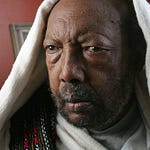“We are a culture that knows about death, but we don't discuss it. We don't discuss sex either. With us, you can have sex as long as you don't let us know. There is a whole language for discussing sex, but it is very subtle - a child could be in the room and would never know that is what you are talking about. But a person who has AIDS, every time you look at this person you must confront sex and death. These are the things that make it too difficult to handle.” (Noerine Kaleeba, Ugandan working for UNAIDS quoted in Suzanne Daley’s, “AIDS Is Everywhere, But the Africans Look Away”, The New York Times, 4 December 1998)
It would be the understatement of the millennium to say the HIV/AIDS epidemic changed the conversation about sex in on the African continent. Even more than the ravages of the colonial era, the epidemic stripped joy and dignity from the participation in and power of the sexual act with the ruthlessness of a hurricane stripping leaves and branches from trees, leaving in its wake a devastated landscape and a people still struggling to recover. As a young child in Cameroon in the 90s, I watched and listened with increasing dread and fascination as HIV/AIDS sensitization messages and the accompanying paranoia worked their way into radio, television, newspaper programming and the community. Coupled with the regular admonishments us girls received about pregnancy, the underlying message was clear: Sex is dangerous and sexual desire is destructive.
Interestingly, many traditional African communities of the past shared this sentiment, albeit in a more life-affirming way, as evidenced by the taboos and mores they had around sex. This is what I explore in this episode of the MA Podcast which is drawn from the Deep Dive we did into African sexualities on the MA YouTube channel. Understanding the helpful and harmful ways we have historically approached sexuality is critically important if we are to have a reclamation of African sexual eroticism from the grasp of the devastation of the epidemic which itself is rooted in the clash between the colonial legacy of repressive Victorian era sexual values and the panoply of traditional African sexual values on the ever expanding arena of globalization. The outcome of this conflict is what Kenyan philosopher John Murungi describes as the exoticization and fetishization with subtle or not so subtle suggestions of barbarism that has resulted in the subjection of the African body to a racist regime which, in an effort to distance the African body from the European body, alienates Africans from their own bodies, generating and perpetuating a distorted aestheticism in both the African and the global mind.
But how, exactly? This alienation from our own bodies and from joyous participation in the one of the sweetest gifts of embodiment, which also happens to be the literal creative force behind our existence as a species, runs deep. Sex, who should be having it, and how, remains one of the most divisive topics on the continent.
For me, the arts, especially books, cinema, music and dance, have always proven effective ways to explore and resolve any existential crises I have about sexuality, mine or other’s. Through these media, I have encountered other people on their sexual evolution and found company and illumination where I might have fumbled around in confusion. Nothing gives a better snapshot or tells the future of a society’s disposition toward a controversial topic than the way it is presented in its literary scene, its cinema, its music and its dance. The adults in my life probably didn’t appreciate it but as a child growing up in the Cameroon of the 1990s and 2000s when the Damocles’ sword of the unfolding HIV/AIDS epidemic hung over almost all conversations about sex, the increasingly risqué books I chomped my way through like a caterpillar on a tree, the racy French and other European movies which popped up on TV, as well as the music and dance – Petit Pays’ gall and irreverence, Rantanplan, and other female Bikutsi artist’s frenzied, brazen defiance, the slow sensuality of Ndombolo and the insistent pulse of Mapouka, so reminiscent of that other dance, American Hip Hop and RnB in all their witty ribaldry, their insistence on sex as something enjoyable enough to write about, perform, sing, dance, talk and even laugh about, all these things, even with the often embedded dysfunction, rescued it from the grinding weight of that ever looming fear.
I hope you enjoy the episode and continue to find safe, life-affirming and above all, pleasurable ways to embody and express your sexuality, however you understand it. Sex is, after all, a part of life, a very material part of our humanity, our experience with the real, so why shouldn’t it be in [media]? Sex (and the sex scene) is a place where provocation, pleasure for pleasure’s sake, desire, curiosity, messiness, nuance, spectacle, and equally, banality, and all of life’s ambiguities, beauties, and perversions can exist at once. But it requires creation and engagement beyond passive consumption and reflexive, flattened regurgitation.
Check out the MA YouTube page for accompanying slides and references













Share this post